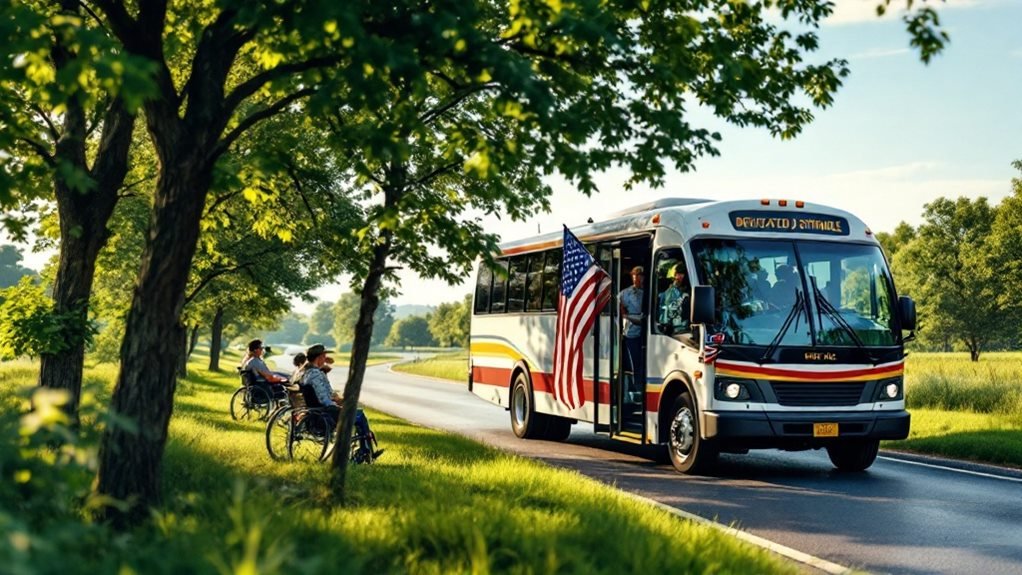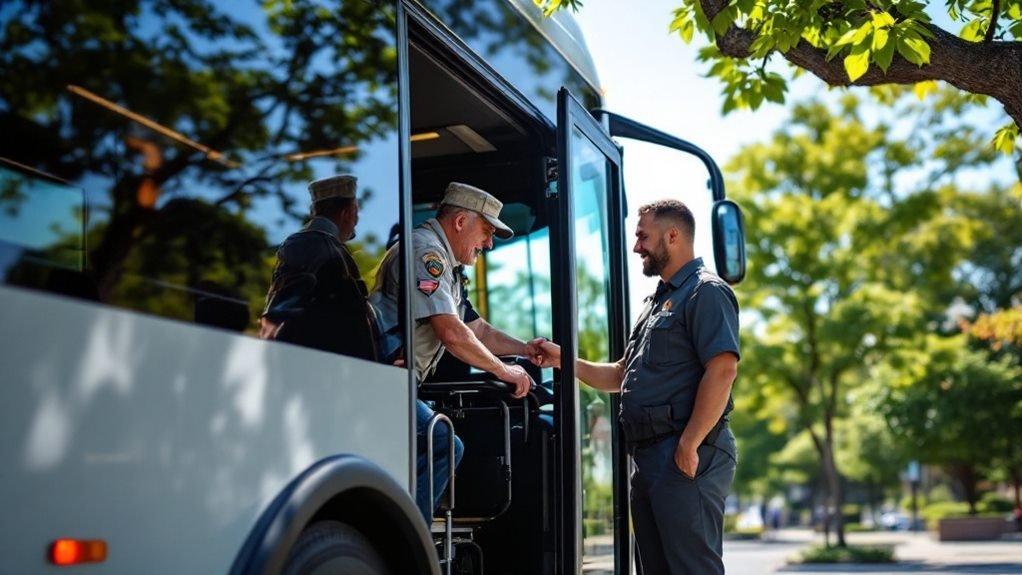You might be surprised to learn that in Florida, there are specific circumstances where you could drive a school bus without a CDL. While most assume a Commercial Driver's License is always required, there's more nuance to the law than meets the eye. Understanding the classifications and exemptions involved could open unexpected opportunities or reveal potential pitfalls. Are smaller school buses exempt, and what are the legal implications if you bypass the usual requirements? Exploring these questions could shed light on a topic that impacts both safety and legality on Florida's roads.
Key Takeaways
- A CDL is required for school buses with a GVWR of 26,001 pounds or more in Florida.
- Smaller buses carrying fewer than 16 passengers may not require a CDL.
- Some private and non-profit organizations may operate buses without a CDL under specific conditions.
- Legal consequences exist for operating a school bus without a CDL when required.
- Proper training and compliance with state regulations are essential for student safety.
Florida School Bus Licensing Requirements
When it comes to driving a school bus in Florida, understanding the licensing requirements is vital. You need to be well-versed in the state's specific school bus regulations to guarantee the safety of the students you transport.
Florida mandates that anyone operating a school bus must possess a commercial driver's license (CDL) with the appropriate endorsements. This is non-negotiable and directly tied to driver safety, as the safety of schoolchildren depends on skilled and qualified drivers.
Before you can step behind the wheel, you're required to complete a thorough background check, including fingerprinting and a review of your driving record. This guarantees that only individuals with a clean history are entrusted with transporting students.
Additionally, you must pass a physical examination to verify that you're fit for the demands of driving a large vehicle.
Moreover, Florida's school bus regulations stipulate that you complete specific training programs. These programs cover essential driver safety measures, emergency procedures, and student management techniques.
Understanding CDL Classifications
Understanding CDL classifications is essential for anyone planning to drive a school bus in Florida. The CDL, or Commercial Driver's License, is categorized into different classes that determine what types of vehicles you can operate. Knowing these CDL classifications helps guarantee you're qualified and prepared to safely transport students.
There are three main CDL classifications: Class A, Class B, and Class C. Each classification has specific CDL definitions that dictate the vehicle type and size.
Class A allows you to operate combination vehicles with a Gross Combination Weight Rating (GCWR) of 26,001 pounds or more, provided the towed vehicle exceeds 10,000 pounds. Class B covers single vehicles with a GCWR of 26,001 pounds or more, or any such vehicle towing a vehicle not exceeding 10,000 pounds. Class C is for vehicles designed to transport 16 or more passengers, including school buses, or those carrying hazardous materials.
As a school bus driver, you'll primarily focus on Class B and C, depending on the bus's size and passenger capacity.
Exemptions to CDL Requirements
While understanding CDL classifications is important for prospective school bus drivers in Florida, it's equally essential to know about the exemptions to these requirements. There are specific circumstances where you might be eligible to operate a school bus without a CDL, making it valuable to be aware of these school bus exemptions.
One key exemption applies to vehicles designed to carry fewer than 16 passengers, including the driver. In such cases, you can drive without a CDL, as these are typically classified differently under Florida law.
Additionally, some private and non-profit organizations sometimes operate buses that fall under non CDL drivers' categories due to their size or function. Operating smaller school buses for daycare centers or community programs mightn't require a CDL, provided they meet specific criteria. This exception allows individuals passionate about serving their communities to contribute without undergoing the rigorous CDL certification process.
However, it's vital to remember that safety and compliance with state regulations are paramount. Even as a non CDL driver, you should prioritize proper training and understanding of vehicle operation to guarantee the safety and well-being of the students or passengers in your care.
School Bus Size and CDL Needs
The size of your school bus directly impacts whether a CDL is necessary under Florida law. Understanding the specific school bus dimensions and vehicle weight is essential.
If the bus has a Gross Vehicle Weight Rating (GVWR) of 26,001 pounds or more, it's mandatory for you to have a CDL. This threshold guarantees that only qualified drivers operate larger, heavier vehicles, which can be more challenging to maneuver safely.
For smaller school buses, typically those with a GVWR under 26,001 pounds and designed to transport fewer than 16 passengers, you mightn't need a CDL. However, it's important to verify the exact specifications of your vehicle.
The school bus dimensions, including length, height, and width, can also influence handling and safety requirements. Larger buses often require additional training to guarantee the safety of your precious cargo.
Steps to Obtain a CDL
To get started on obtaining a Commercial Driver's License (CDL) in Florida, you need to familiarize yourself with the specific requirements and steps involved in the process.
First, confirm you meet the age criteria—18 years for intrastate and 21 for interstate driving. Next, gather your identification documents and proof of residency.
Visit your local Department of Motor Vehicles (DMV) office to complete a CDL application and pay the necessary fees.
The CDL testing process involves a written knowledge test and a skills test. The knowledge test covers general commercial vehicle operation, while the skills test assesses your ability to drive safely and efficiently.
Schedule these tests ahead of time and prepare thoroughly to guarantee success.
Once you've passed your tests, you'll receive your CDL. Remember, serving others safely and responsibly is paramount, and staying informed about CDL renewal requirements is vital.
Typically, a CDL in Florida is valid for eight years, but keeping track of expiration dates and any changes in regulations will help you maintain compliance.
Renew your CDL on time to continue your service without disruptions. Engaging in this process demonstrates your commitment to safely transporting those who depend on you.
Training and Certification Programs
Although steering the path to driving a school bus in Florida without a CDL may seem intimidating, training and certification programs are designed to equip you with the necessary skills and knowledge.
These programs employ thorough training methods that focus on both the technical aspects of bus operation and the softer skills required for safe and effective student transport. You'll learn essential driving techniques, safety protocols, and student management strategies, all tailored to guarantee the well-being of your passengers.
The certification benefits extend beyond just gaining the ability to drive a school bus. They instill confidence and competence, enabling you to handle various on-road scenarios with assurance.
These programs often include classroom instruction, hands-on driving practice, and assessments to confirm you're fully prepared for the challenges of school bus driving. You'll emerge not just as a driver, but as a guardian of the students' safe journey.
Legal Implications of Driving Without CDL
While training and certification programs prepare you to drive a school bus, understanding the legal implications of doing so without a Commercial Driver's License (CDL) in Florida is equally important.
Driving a school bus without the proper licensing isn't just a minor oversight—it's a serious legal issue. The state of Florida mandates that all school bus drivers possess a CDL with the appropriate endorsements. Failing to comply with this requirement can lead to significant legal consequences.
If you're caught driving a school bus without a CDL, you could face hefty fines and penalties. These fines aren't just monetary; they can include points on your driving record, which can impact your future employment opportunities.
In addition, driving without a CDL puts the safety of children at risk, which could lead to even more severe legal repercussions if an accident occurs.
For someone committed to serving others, especially children, understanding these legal obligations is essential. The responsibility of ensuring the safety and legality of your driving practice can't be overstated.
It's not just about avoiding fines and penalties, but also about upholding the trust placed in you by parents and the community.
Alternative School Bus Driver Roles
Exploring alternative school bus driver roles can provide rewarding career opportunities without the need for a CDL. If you're passionate about serving your community and guaranteeing safe transportation for children, there are several paths to contemplate.
One viable option is working with smaller vehicles that don't require a CDL, such as vans or mini-buses. These vehicles often support specialized routes, catering to students with unique needs or transporting smaller groups to extracurricular activities.
Another avenue is joining community shuttle services. These services play a significant role by offering alternative transportation options to schools, especially in areas where traditional bus routes may not be feasible. By driving a community shuttle, you contribute to a network that guarantees every student has access to education, regardless of their location.
This role also allows you to engage with children and parents, fostering a sense of community trust and support.
Moreover, you could evaluate roles in transportation coordination or supervision, where your insights can help improve route efficiency and safety.
Conclusion
So, you think you can drive a school bus in Florida without a CDL? Well, legally speaking, that's like trying to win a marathon with untied shoelaces. Sure, some exceptions exist for smaller buses, but why risk the safety of students or face hefty penalties? Obtaining a CDL isn't just a recommendation; it's a responsibility. Embrace the irony—safeguard the future by following the rules today. After all, rules are there to keep everyone safe, right?



